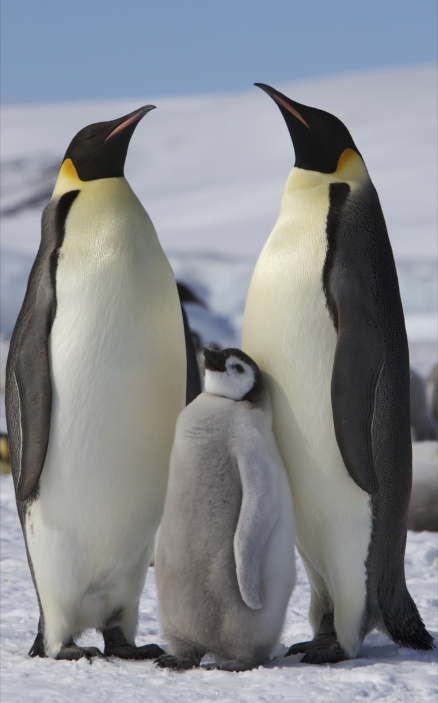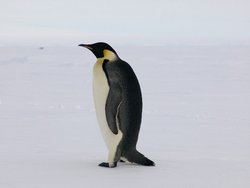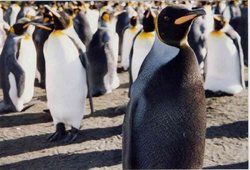Great penguins (Ornithology)
Contents
Great penguins

Adults and a juvenile on Snow Hill Island, Antarctica (By Ian Duffy from UK (Animal Portraits Uploaded by Snowmanradio) (http://creativecommons.org/licenses/by/2.0), via Wikimedia Commons)
|
Scientific Classification Kingdom: Animalia |
The Great penguins (scientific name: Aptenodytes) are a genus of two penguin species within the penguin family of seventeen species - Emperor penguins (Aptenodytes forsteri) and King penguins (Aptenodytes patagonicus).
Like all penguins, Great penguins are characterized by their erect posture, stiff wings, excellent swimming ability, awkward movement out of water, and coloring.The black backs and white fronts, make all penguins difficult to see when swimming, blending against the sea from above and the sky from below.
The Great penguins are notable in several ways:
- They are the largest penguins
- Long slender bills
- Distinct dark yellow coloring on parts of the upper body
- Can dive longer and deeper than other penguins
- Build no nest, but balance the egg on their feet
- Circumpolar distribution: the King Penguin in the sub-Antarctic, restricted to islands; the Emperor penguin in the high Antarctic.
The conservation status of both species is Least Concern .
The Great penguins (scientific name: Aptenodytes) are a genus of two penguin species within the penguin family of seventeen species - Emperor penguins (Aptenodytes forsteri) and King penguins (Aptenodytes patagonicus).
Detailed species information
|
|
Further Reading
- Aptenodytes Penguinworld.com (accessed March 29, 2009)
- Species 2000 & ITIS Catalogue of Life: 2009 Annual Checklist. Bisby FA, Roskov YR, Orrell TM, Nicolson D, Paglinawan LE, Bailly N, Kirk PM, Bourgoin T, Baillargeon G., eds (2009), Species 2000: Reading, UK.



0 Comments